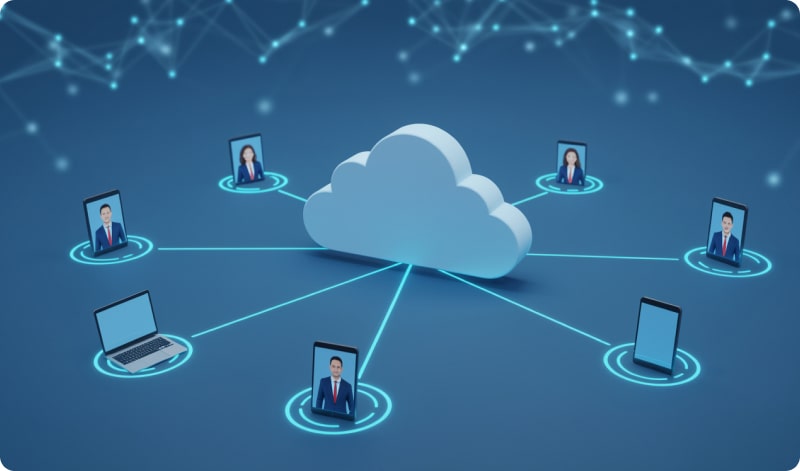
A few years ago, managing a call center meant rows of phones, manual logs, and clunky servers. Today, the same operations can run seamlessly in the cloud or through hybrid and on-premise setups, powered by automation, AI, and data analytics. The evolution of call center software types has completely changed how businesses communicate, sell, and support customers.
For CSPs and telecom providers, this transformation opens a massive new revenue stream. Enterprises are now demanding flexible, AI-ready communication tools that can be hosted in the cloud or deployed on-premise as per their compliance and operational needs. That’s exactly where white-label PABX and contact center platforms come in, offering CSPs the power to deliver scalable business telephony solutions in any environment.
Before exploring that opportunity, it’s worth understanding the different types of call center and contact center software that power modern enterprise communication.
What is Call Center Software?

The primary purpose of call center software is to help businesses manage customer communications easily and in an organized way. Such a software is a technology platform that connects the business’s support team with the customers over phone calls, i.e., answering support calls, handling sales inquiries, or running outbound campaigns.
In traditional setups, call centers mainly focused on voice calls, i.e., managing large volumes of incoming and outgoing calls efficiently. But with evolution in technology and the rising customer expectations, call center software became much more than just telephony management. Today, advanced call center solutions allow agents to handle everything from inbound, outbound, and blended communications – all from one single dashboard. That’s where the distinction between a call center and a contact center comes in.
Often, the terms “call center software” and “contact center software” are used in the industry interchangeably; however, these are not the same. While the call center software focuses on voice communication, the contact center software goes a step further, integrating multiple communication channels like voice, email, chat, SMS, and even social media – all into one unified platform. You can call it a multi-channel hub that ensures a seamless omnichannel customer experience.
In essence, contact center software is an advanced version of call center software because it integrates multiple communication channels, such as email, chat, and social media, rather than just focusing on voice calls.
Different Types of Call Center Software
Many businesses still rely on those traditional, scattered systems for their customer interactions, due to which their efficiency, customer experience, and growth suffer. Such businesses need to look ahead and transition to modern call center software. However, not all call center software works the same. So let’s look at the most common types of call center software:
1. Inbound Call Center Software
This type of software is designed to handle incoming customer queries efficiently. Key features of inbound call center software include IVR (Interactive Voice Response), ACD (Automatic Call Distributor), Call Routing, Queue Management, and CRM Integration. These systems are commonly used for customer support, technical assistance, and help desks.
2. Outbound Call Center Software
Contrary to Inbound systems, outbound call center software is used for sales, telemarketing, lead generation, and follow-ups, i.e., interactions that are initiated by agents. Key features of this software include auto-dialing, call recording, analytics, and campaign management.
3. Blended Call Center Software
The name says it all – blended call center software combines both inbound and outbound capabilities, enabling agents to handle both types of communications seamlessly. Key features of blended call center software include dynamic call assignment, real-time agent monitoring, and a unified interface.
4. On-Premise Call Center Software

This type of software is installed locally on company servers, which means it requires upfront hardware and IT maintenance. The main advantage of having on-premise call center software is that it offers full control and customization, which is often essential for large enterprises or government organizations for privacy and compliance.
5. Cloud-Based Contact Center Software or CCaaS

Software that is hosted in the cloud is referred to as a cloud-based contact center software, which is accessible from anywhere through an internet connection. The popularity and adoption of these solutions are due to their benefits in terms of scalability, flexibility, and cost savings. These are a great option for remote teams and CSPs wanting to offer white-label contact center services.
6. Hosted Call Center Software
Hosted solutions strike a balance between cloud convenience and greater control. In this model, the software runs on dedicated servers managed by a third-party provider, often offering higher customization and security than public cloud systems.
7. AI-Powered Contact Center Software
These are the most widely popular call center software nowadays. As the term suggests, this software leverages AI or Artificial Intelligence for automation, speech analytics, sentiment detection, and predictive routing. AI-driven solutions come packed with powerful features, including AI chatbots, virtual assistants, voice recognition, and auto-quality analysis. Not only does this software help in reducing agent workload, but it also boosts their efficiency.
8. Omni-Channel Contact Center Software
A software that connects all communication channels, voice, chat, email, SMS, and social into one unified customer view. With features like cross-channel routing and consistent reporting, it ensures seamless experiences across every touchpoint. Ideal for customer-focused enterprises, it helps deliver consistent, personalized service no matter how customers reach out.
Features Every Call Center Software Should Have
Today’s businesses expect flexible, AI-powered, and omnichannel solutions that work seamlessly across voice, chat, email, and more. That’s why CSPs need platforms that are not only feature-rich but also scalable, secure, and customizable for different enterprise needs.
Let’s explore what CSPs should look for when choosing a white-label solution to serve their clients better.
Intelligent Routing
A good call center software would certainly have this feature because it will ensure that every incoming call gets directed to the right department or agent. The call routing executes automatically based on predefined rules that help in saving time and boosting customer satisfaction. According to Zendesk, 73% of customers expect personalized support, and intelligent routing makes that possible.
IVR (Interactive Voice Response)
This feature is basically an automated voice menu that assists the callers before they get connected to a live agent. It helps the callers with self-service for simple queries such as checking balance, order status, etc. Most often, the IVRs with short, clear menu options are considered useful for callers.
Automatic Call Distribution (ACD)
True to its name, ACD automatically distributes incoming calls evenly among available agents. It’s an excellent way to maintain workload balance and reduce customer wait times.
Call Recording & Monitoring
Another feature indicative of its name, this one is significant for quality assurance and compliance. Recorded calls are useful in training and dispute resolution, while live monitoring helps supervisors to listen to calls in real-time.
Call Analytics & Reporting

In today’s world, data is power, right? Modern call center software offers real-time dashboards showing agent performance, call volume trends, Average Handling Time (AHT), Customer Satisfaction Score (CSAT), and First Call Resolution (FCR) rates. The benefit? This helps managers make data-driven decisions and optimize staffing quite easily.
CRM Integration
This feature is a must-have in both call centers and contact centers. Integration of the software with existing CRM systems helps agents view caller details, history, and preferences right on their screen, providing personalized service instantly.
Outbound Dialers
For running outbound campiagns effectively, dialers are an ideal tool because of their ability to automate the dialing process. Dialers are available in several types, such as:
- Auto Dialer: Calls numbers automatically, connecting agents only when a live person answers.
- Predictive Dialer: Uses algorithms to predict agent availability and call timing.
- Power Dialer: Calls numbers one after another when an agent is free.
- Progressive Dialer: Displays contact info before dialing for a more personalized approach.
Did you know that a predictive dialer can increase agent talk time by 200–300% compared to manual dialing (source: CallHippo).
Omnichannel Communication
This is where contact center software goes beyond traditional voice calls. Here, all customer interaction channels are integrated into one dashboard. Typically, these channels include voice calls, live chat, email, SMS, WhatsApp, and social media. The biggest benefit of omnichannel communication is that customers experience a seamless journey, and agents can see previous interactions across different channels in one place.
AI-Powered Routing & Virtual Agents

Contact center software with advanced features have AI-integrated functionality. Here, AI analyzes intent, tone, and historical data to route calls more effectively or even resolve them via AI chatbots or voice bots. Due to its efficiency, AI is a must-have feature in enterprise contact center solutions. Did you know – Gartner predicts that by 2026, 75% of customer service interactions will be powered by AI or automation.
Security and Compliance Features
Modern systems ensure end-to-end security with TLS for data in transit and SRTP for voice and video protection. Role-Based Access Control (RBAC) restricts access based on user roles, while detailed audit logs maintain transparency and accountability. Compliance with global standards like GDPR, HIPAA, and PCI-DSS further reinforces data privacy and trust.
How to Choose the Right Call Center Software for Your Business
With so many options, each promising advanced features, seamless integrations, and higher ROI, it’s a bit overwhelming to choose the right call center software for your needs. Here’s a step-by-step breakdown to help you make an informed and confident decision.
What’s Your Business Type and Communication Needs?
Begin by asking: What do we really want to achieve with this call center software?
Small businesses with limited resources and needs might prefer a cloud-based call center software that’s easy to set up, affordable, and requires minimal IT maintenance. For large enterprises or CSPs, a next-gen contact center solution with features like multi-tenant support, AI routing, and extensive analytics dashboards might be the ideal choice.
Which deployment Model do You Prefer?
As we already discussed, different types of contact center technology come in different deployment options:
- Cloud-based solutions are perfect for businesses that prioritize remote work, fast onboarding, and easy upgrades.
- On-premise solutions offer more control and customization but come with higher setup and maintenance costs.
- Hybrid systems blend the best of both worlds – local control with cloud flexibility.
What Features Match Your Requirement?
Every business has its own unique functionalities; therefore, based on your goals, you may consider the following features:
|
Goal |
Key Features to Look For |
| Improve customer satisfaction | IVR, call recording, live monitoring, AI routing |
| Enhance team productivity | Auto dialer, predictive dialing, CRM integration |
| Expand communication channels | Omnichannel support (voice, chat, SMS, WhatsApp) |
| Strengthen security | Multi-layer encryption, call logs, role-based access |
| Gain insights | Real-time analytics, performance dashboards, reporting |
Often, buyers get trapped in feature overload, which means they run after software that flashes enormous features. However, a wise move is to prioritize usability, scalability, and integration with your existing tools like CRMs or ticketing systems.
How is Support, Security, and Compliance?
Call center software is all about handling hundreds and thousands of customer interactions, which simply indicates that security and reliability are non-negotiable.
Look for:
- 99.99% uptime and redundancy systems
- Compliance with global standards like GDPR, HIPAA, or ISO
- Dedicated support with 24/7 assistance
Remember, a well-supported call center platform doesn’t just fix issues, it prevents them.
How Good is the Long-Term Value?
The cost at which you buy the software is an important factor, but the value offered by the software matters more. A platform with a lower cost may lead to heavier consequences later in terms of downtime, limited scalability, or a lack of automation.
So what would be a smart choice? If you are a CSP looking for a white-label, cloud-hosted platform, REVE’s Cloud PABX and Contact Center Solution is purpose-built for you. It combines flexibility, automation, and brand ownership, letting you deliver enterprise-grade communication services under your own name.
What’s Next? Grow Your Communication Business With REVE
Selecting the right call center software can redefine how your business connects with customers. At REVE Systems, we empower CSPs and telecom operators to deliver enterprise-grade communication services through our white-label Cloud PABX & Contact Center Solution. With over 4,500 providers in 80+ countries trusting our technology, REVE helps you unlock new revenue streams, enhance efficiency, and deliver world-class service experiences, all under your brand.
If you’d like to explore how REVE can help you launch or scale your enterprise communication offerings, book a free consultation or demo with our experts today.
Frequently Asked Questions: Types of Call Center Software
Which type of call center software is best for enterprises?
Enterprises benefit from omnichannel, AI-driven contact center platforms with features like CRM integration, advanced analytics, and automation
What is a white-label contact center solution?
A white-label contact center solution allows CSPs or resellers to rebrand and sell the platform as their own, expanding revenue without building infrastructure from scratch.
What are the common challenges of traditional call centers?
Legacy systems are costly, inflexible, and difficult to scale, often lacking analytics and remote accessibility, which modern cloud platforms easily solve.
How can CSPs benefit from REVE Cloud Contact Center Solution?
CSPs can launch branded, ready-to-sell enterprise solutions, offering call routing, IVR, analytics, and omnichannel communication to business clients while generating recurring revenue.
Why should I consider REVE Systems for my call center solution?
REVE Systems offers trusted, carrier-grade communication platforms trusted by 4,500+ service providers in 80+ countries, delivering reliability, innovation, and flexibility for CSPs and enterprises alike.






















